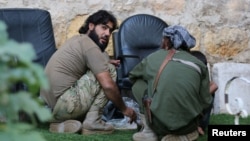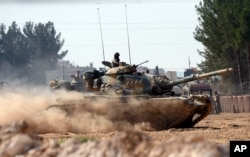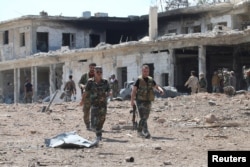With the Islamic State's self-styled caliphate straddling Syria and Iraq shrinking thanks to land losses to the group's many foes, its jihadist rival — al-Qaida's rebranded affiliate in Syria — is marketing its own nation-building and doing so by imitating propaganda techniques employed by its competitor.
And its increased propaganda output is taking aim once again at its struggling rival, apparently in a bid to exploit IS's mounting problems — including the loss of 40 out of 43 founding senior leaders mainly to U.S.-led coalition airstrikes and battlefield fighting. On Sunday, Turkish officials claimed their military campaign inside Syria to push back IS from border regions had met with success.
Turkish Prime Minister Binali Yildirim said in a televised speech Sunday: "Thank God, today, from Azaz to Jarablus, our 91 kilometers of borderline with Syria has been entirely secured. All the terrorist organizations were pushed back — they are gone."
The beneficiary
One of the beneficiaries of the blows being dealt IS is Jabhat al-Nusra, which announced in July that it was breaking formal ties with al-Qaida after renaming itself Jabhat Fateh al-Sham, or JFS (Front for the Conquest of the Levant).
There has long been a debate in the ranks of Jabhat al-Nusra about whether it should announce officially an emirate in territory it controls in northern Syria, mainly in the province of Idlib to the west of the besieged city of Aleppo.
The group's leader, Mohammad al-Julani, suggested in a posted audio recording in July 2014 that it was about to do so.
Syrian Jihadists make up JFS
For tactical reasons, apparently mainly focused on avoiding disrupting relations and cooperation with other rebel militias in Syria, the group — made up mainly of Syrian jihadists — has held off. But emirate-building aspirations appear once again to dominate much of its recent propaganda and, as IS is pushed back more and more, Jabhat Fateh al-Sham has been boosting its criticism of rival jihadists while also engaging more directly with Western media.
The propaganda operations are being overseen by an Australian jihadist preacher, the self-styled Sheik Mostafa Mahamed, who last month appeared on British television to show videos of formally fractured rebel groups fighting together under the banner of the JFS.
Media wise
Among the techniques JFS is copying is using teasers to boost the audiences for posted videos. Former U.S. ambassador Alberto Fernandez, an expert on jihadist use of the internet, noted as one "interesting example" a graphic released last week to advertise a forthcoming video that accuses IS of having Muslim blood on its hands and being heretical.
"Notice nothing is said about infidel blood," Fernandez added.
The graphic and video features al-Qaida-linked Sheikh Abdallah Muhammad al Muhaysini, a Saudi cleric and a highly influential jihadist ideologue in Syria, who in April launched a recruiting campaign for then-Jabhat al-Nusra urging young Muslims to "take up arms, do not sit still."
JFS helped defend Aleppo
Al Muhaysini has been at the forefront of the calls for all rebel fighters to unite around Jabhat Fateh al-Sham — a call that has even greater pull with rebel militias since JFS's key role in defending eastern Aleppo from a massive Russian and Iranian-backed Assad regime offensive and managing a breakout last month.
Most Western analysts dismiss JFS's break with al-Qaida as a feint, seeing it as a long game the jihadist group has been playing for some time across the Middle East and Africa.
JFS long-term strategy
In a paper published earlier this year by the Middle East Institute, a Washington-based think tank, analyst Charles Lister contrasted the Islamic State's modus operandi of imposing unilateral control over populations and rapidly proclaiming independence, with al-Qaida's Syrian affiliate moving "much more deliberately, seeking to build influence in the areas they hope to rule."
He argued: "This is a long-game strategy that the terrorist group began adopting in the late 2000s, first in Yemen, in 2011, and then in Mali, in 2012."
A key group in assisting JFS in its long-term aim to dominate the rebel opposition in Syria is Ahar al-Sham, another jihadist militia that al-Qaida leaders helped to found, according to Jennifer Cafarella and Genevieve Casagrande of the Washington-based Institute of the Study of War, a think tank, and Nicholas Heras, an analyst at the Center for a New American Security.
Group may have its own Islamic State
Writing in Foreign Policy magazine, the three analysts say Ahar al-Sham, which has never been formally part of al-Qaida, "Serves as the mortar that binds opposition groups together in northern Syria and is well-positioned to merge these forces with Jabhat Fateh al-Sham and solidify sharia-based governance — all without the world realizing that the result would be a major win for al-Qaida's aims in Syria."
JFS influence over a swathe of the anti-Assad rebel movement has grown in leaps and bounds thanks to the group's vanguard role in the defense of civilians in eastern Aleppo. Its popularity is growing despite the harsh penalties the group's Sharia courts mete out for infringements of a moral and social code not dissimilar to the Islamic State's.
The analysts in their Foreign Policy article worry that Washington's inaction in the defense of the eastern half of Aleppo "may inadvertently be paving the way for Syria's next Islamic State."






